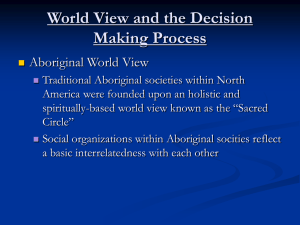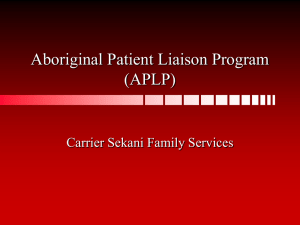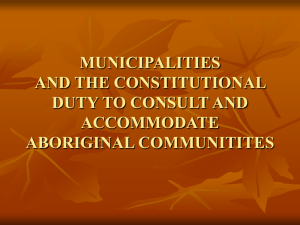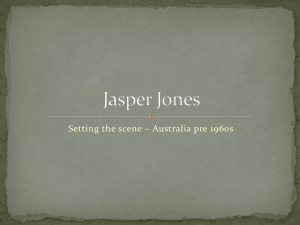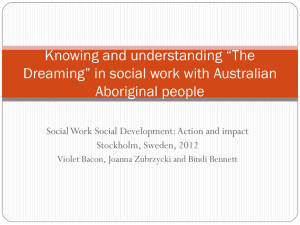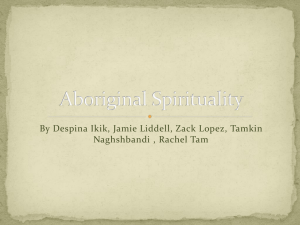The Duty to Consult:
advertisement
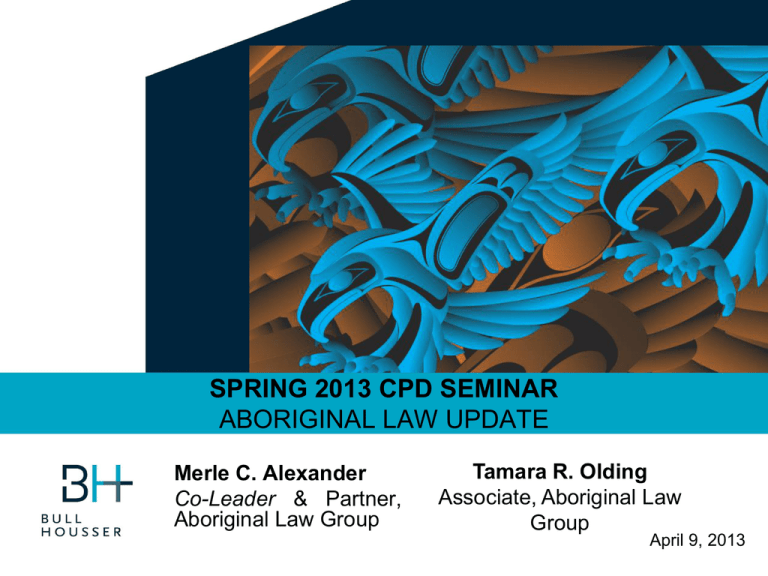
SPRING 2013 CPD SEMINAR ABORIGINAL LAW UPDATE Merle C. Alexander Co-Leader & Partner, Aboriginal Law Group Tamara R. Olding Associate, Aboriginal Law Group April 9, 2013 Format Duty to Consult & Accommodate BACKGROUND on the BASICS BEYOND the BASICS: 1. 2. 3. 4. 5. Do standard public consultation processes satisfy the duty? Can “streamline” legislation prejudice the the duty? Can the procedural/operational aspects of the duty be delegated? Can courts require third parties to negotiate with First Nations? What are the principles in undertaking a strength of claim assessment? NOTABLE CASES IN 2013-2014 THE BASICS • “Whether the Aboriginal group has been consulted” is a factor of the justifiable infringement test: Sparrow (1992) • Duty to consult has a spectrum: mere consultation to deeper (more than mere) and consent: Delgamuukw (1997) • Source of the duty to consult Aboriginal Peoples is the honour of the Crown: Haida (2004) THE BASICS (cont.) • The broad purpose of the duty to consult is process of fair dealing & reconciliation between the Crown and Aboriginal peoples: Haida (2004) • For asserted but unproven rights, the purpose of the duty to consult is to protect these rights from irreversible harm as the settlement negotiations proceed: Rio Tinto (2010) • For proven rights, the purpose of the duty to consult is to fill any procedural gaps in the treaty: Mikisew (2005) & Little Salmon (2010) THE BASICS (cont.) • The duty to consult arises when: • The Crown has real or constructive knowledge of the potential existence of the Aboriginal right or title; and • The Crown contemplates conduct that might adversely affect that Aboriginal right or title: Haida • Consultation after the fact does not satisfy the duty; it must occur prior to the proposed activities: Ross River, Solid Gold Standard Public Consultation Do standard public consultation processes satisfy the duty? NO • In Mikisew, standard public notices & open houses were not sufficient First Nations entitled to a distinct consultation process • Supreme Court of Canada also said that a consultation process that does not contemplate accommodation is flawed • Joint Review Panels do not have the legal authority to accommodate; they will likely not satisfy the duty to consult Streamlining Consultation Can “streamline” legislation prejudice the Crown's ability to fulfill the duty to consult? YES, IF… • The legislation shortens time frames which impedes adequate consultation with Aboriginal Peoples • Failure to fulfill the duty to consult will be considered an unjustifiable infringement of Aboriginal Rights and the legislation may be written down NO, IF… • The legislation includes Aboriginal consultation as a distinct process and allows for accommodation of specific First Nations • No legislation is above the Canadian Constitution or the Rule of Law Delegation of Consultation Can procedural/operational aspects of the duty be delegated to a third party? YES • While the ultimate legal responsibility for fulfillment of the duty to consult resides in the Crown, its operational aspects can be, and often are, delegated to those third parties directly involved in the day-to-day resource development projects: Solid Gold • Industry proponents may be liable for their failure to consult: Platinex, Taseko Mines Ltd Court Ordered Consultation Can courts require third parties to negotiate with First Nations? YES • In Platinex and Solid Gold, the court ordered the parties to negotiate with one another • Not clear who is supposed to pay for First Nations to participate in such negotiations Strength of Claim Assessments • When? • Crown must undertake preliminary assessment of strength of claim when duty to consult triggered • Assessment must be made at the outset of consultation • Scope of the duty to consult is proportionate to: • a preliminary assessment of the strength of the claim supporting the existence of the Aboriginal right or title; and • the seriousness of the potentially adverse effect on the right or title claimed Strength of Claim Assessments • Opportunity to comment? • Crown must provide affected First Nation with an opportunity to comment on the preliminary assessment • First Nations’ obligations? • First Nation must clearly delineate the asserted Aboriginal right that may be infringed, must be context-specific and must outline the traditions and practices relied upon to establish the right: Husby, Halfway River • Evidentiary Principles • Oral history to be treated at face value • Apply flexibility in weighing evidence • Expansive view for unproven rights Case Law – Strength of Claim Assessments • Adams Lake Indian Band v. British Columbia 2011 BCSC 266 • Aboriginal rights and title claim to lands within Sun Peaks development area • Reliance by the Court upon Provincial Ethnographic Report and Adams Lake affidavits • Current exercise by Adams Lake of traditional use activities • Court found strong prima facie claim to Aboriginal rights and good prima facie claim to Aboriginal title • Deep duty of consultation Case Law – Strength of Claim Assessments • Louis v British Columbia (Energy, Mines and Petroleum Resources), 2011 BCSC 1070 • Stellat’en First Nation claim of Aboriginal title and exclusive right to use & occupy land on which Endako Mine is situated > Area also within Nadleh Whut’en First Nation asserted traditional territory “Crown’s preliminary assessment that Stellat’en had a prima facie case the strength of which was tempered somewhat by overlapping Aboriginal claims and existence of fee simple title was correct” • Court approved Crown’s judgment on the scope & content of the duty to consult the Stellat’en • First Nations’ failure to substantiate the existence of claimed rights may reduce the onus on the Crown to address any concerns of effects in the decision-making process DUTY TO CONSULT CASES TO WATCH in 2013/2014 Notable Cases William v British Columbia, 2012 BCCA 285 • Action by members of the Tsilhqot'in Nation seeking recognition of Aboriginal rights, declaration of title over traditional territory & damages for unjustifiable infringements of rights by the Crown • Trial: 339 court days over a span of nearly 5 years > Justice Vickers opined that Aboriginal title had been established on the evidence adduced, but did not issue a "formal" declaration of Aboriginal title due to a technical error in the pleadings > • Appeal: > Aboriginal title must be proven on a “site specific” approach that involves proof of regular and intensive use of specific tracts of land, rather than a “territorial” approach that focuses on whether the First Nation moved through the land area to the exclusion of others • SCC: Leave to appeal granted (Jan 2013) Notable Cases (cont.) Attorney General of Canada v Ahousaht Indian Band, 2012 SCC • Claim of Aboriginal right to commercial geoduck fishery • SCC: Case remanded to the BC Court of Appeal to be reconsidered in accordance with the decision in Lax Kw’alaams Indian Band v. Canada (Attorney General), 2011 SCC 56 • Lax Kw’alaams: Claim to Aboriginal right to commercial harvesting and sale of “all species of fish” within their traditional water > SCC decision: continued on next slides > Notable Cases (cont.) Lax Kw’alaams Indian Band v. Canada (Attorney General), 2011 SCC 56 • Claimed right to commercially fish all fish species in territory was not "logical evolution" of pre-contact trade in eulachon grease: “Had it been established, for example, that a defining feature of the distinctive Coast Tsimshian culture was to catch whatever fish they could and trade whatever fish they caught, a court ought not to “freeze” today’s permissible catch to species present in 1793 in the northwest coastal waters of BC. As the oceans have warmed, new species have come north from southern waters and the migratory pattern of some of the old species may have shifted towards Alaska. […] However, this example […] is very different from the situation we have here, where trade was an exception to the general sustenance fishery and the only subject matter of trade was eulachon grease.” Notable Cases (cont.) Lax Kw’alaams (cont.) Importance of pleadings in characterizing claims to Aboriginal rights: “To the extent the Lax Kw’alaams are saying that, in Aboriginal and treaty rights litigation, rigidity of form should not triumph over substance, I agree with them. However, the necessary flexibility can be achieved within the ordinary rules of practice. Amendments to pleadings are regularly made in civil actions to conform with the evidence on terms that are fair to all parties.” New stage for establishing commercial rights: “in the event that an Aboriginal right to trade commercially is found to exist, the court, when delineating such a right should have regard to […] “objectives such as the pursuit of economic and regional fairness, and the recognition of the historical reliance upon, and participation in, the fishery by non-aboriginal groups […] the reconciliation of aboriginal societies with the rest of Canadian society may well depend on their [these objectives’] successful attainment” Notable Cases (cont.) Ross River Dena Council v Government of Yukon, 2012 YKCA 14 • Constitutionality of free-entry system in Quartz Mining Act • Ross River Dena Council sought a declaration that the Government of Yukon has a duty to consult prior to recording a mineral claim on lands within the Ross River Area “Statutory regimes that do not allow for consultation and fail to provide any other equally effective means to acknowledge and accommodate Aboriginal claims are defective and cannot be allowed to subsist” • New regime must allow for an appropriate level of consultation before Aboriginal claims are adversely affected • Yukon filed application for leave to appeal (Feb 2013) Thank you!



